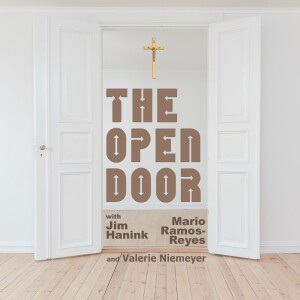
Episode 289: Andrew Mioni on the Catholic Traditionalist Movement (July 24, 2024)
 2024-07-24
2024-07-24
Download
Right click and do "save link as"
On this episode of The Open Door (July 24), panelists Jim Hanink, Valerie Niemeyer, and Christopher Zehnder discuss the Catholic traditionalist movement. Our special focus will be “independent” traditionalists. How do they differ from other traditionalists? What leads them to “LeFebvreism”? What can we learn from the ongoing debate about the movement’s role in the Church? Our welcome guest is Andrew Mioni. He is a graduate of Kansas State University, with a B.A. in English. As a contributor to Faith in Crisis (Wipf and Stock, 2024), he explores the roots of what some see as a crisis of faith in Catholicism. Mioni is the author of Altar Against Altar: An Analysis of Catholic Traditionalism (En Route Books, 2024).
view more
- For clarification: What is the difference between the SSPX, the Society of St. Pius X initiated by Archbishop Marcel Lefebvre, and the FSSP, the Fraternal Society of Saint Peter?
- How do you understand the word “ideology”?
- Who are the sedevacantists?
- How has George Weigel, a St. John Paul II scholar and frequent contributor to First Things, helped you to put the traditionalist movement in a broader context?
- Richard John Neuhaus, once a Lutheran, thought that the chief complaints of the Reformation had been answered. You ask the “independents” what would count as the crisis in Catholicism being resolved. What sort of an answer should we expect?
- Why do you think that “To be deep in history is to cease to be traditionalist”?
- Just what is modernism? How is it linked to a certain view of reason?
- To what do you attribute a crisis of faith dating back well before Vatican II?
- What is the authority of the ordinary magisterium of the Church? Does Vatican II express that authority?
- Could you explain the “functionalist” approach to spirituality and the liturgy?
- How have the lessons you learned in authoring your book carried over into your own parish life?
- What’s your next book project?
More Episodes
WCAT Radio The Open Door (March 22, 2019)
 2019-03-22
2019-03-22
 2019-03-22
2019-03-22
WCAT Radio The Open Door (March 15, 2019)
 2019-03-15
2019-03-15
 2019-03-15
2019-03-15
WCAT Radio The Open Door (March 8, 2019)
 2019-03-08
2019-03-08
 2019-03-08
2019-03-08
WCAT Radio The Open Door (March 1, 2019)
 2019-03-02
2019-03-02
 2019-03-02
2019-03-02
WCAT Radio The Open Door (February 22, 2019)
 2019-02-24
2019-02-24
 2019-02-24
2019-02-24
WCAT Radio The Open Door (February 15, 2019)
 2019-02-15
2019-02-15
 2019-02-15
2019-02-15
WCAT Radio The Open Door (February 8, 2019)
 2019-02-07
2019-02-07
 2019-02-07
2019-02-07
WCAT Radio The Open Door (February 1, 2019)
 2019-02-04
2019-02-04
 2019-02-04
2019-02-04
WCAT Radio The Open Door (January 25, 2019)
 2019-01-27
2019-01-27
 2019-01-27
2019-01-27
WCAT Radio The Open Door (January 18, 2019)
 2019-01-19
2019-01-19
 2019-01-19
2019-01-19
WCAT Radio The Open Door (February 9, 2018)
 2019-01-14
2019-01-14
 2019-01-14
2019-01-14
WCAT Radio The Open Door (February 2, 2018)
 2019-01-14
2019-01-14
 2019-01-14
2019-01-14
WCAT Radio The Open Door (January 26, 2018)
 2019-01-14
2019-01-14
 2019-01-14
2019-01-14
WCAT Radio The Open Door (January 19, 2018)
 2019-01-14
2019-01-14
 2019-01-14
2019-01-14
WCAT Radio The Open Door (January 12, 2018)
 2019-01-14
2019-01-14
 2019-01-14
2019-01-14
WCAT Radio The Open Door (January 5, 2018)
 2019-01-14
2019-01-14
 2019-01-14
2019-01-14
WCAT Radio The Open Door (December 15, 2017)
 2019-01-14
2019-01-14
 2019-01-14
2019-01-14
WCAT Radio The Open Door (December 8, 2017)
 2019-01-14
2019-01-14
 2019-01-14
2019-01-14
WCAT Radio The Open Door (December 1, 2017)
 2019-01-14
2019-01-14
 2019-01-14
2019-01-14
WCAT Radio The Open Door (November 24, 2017)
 2019-01-14
2019-01-14
 2019-01-14
2019-01-14
012345678910111213141516171819
Create your
podcast in
minutes
- Full-featured podcast site
- Unlimited storage and bandwidth
- Comprehensive podcast stats
- Distribute to Apple Podcasts, Spotify, and more
- Make money with your podcast
It is Free
- Privacy Policy
- Cookie Policy
- Terms of Use
- Consent Preferences
- Copyright © 2015-2024 Podbean.com




